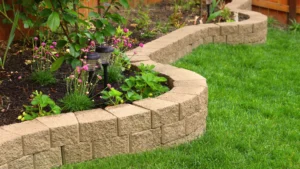
But how do you know which colours evoke which emotions? And how can you use them effectively? If you’ve ever stood in a garden centre overwhelmed by options, you’re not alone. Many homeowners want a garden that feels right but struggle to translate mood into design. That’s where we come in.
At Bonsai Landscapes, we combine expert knowledge of colour theory in garden design with practical landscaping experience to create outdoor spaces that don’t just look good, they feel right to. The right garden colour schemes can make all the difference – let’s explore the subject further.
Colour theory in garden design draws on basic principles of art and psychology to shape how we experience outdoor spaces. Just as interior designers use paint, furniture, and lighting to craft a particular vibe, landscape designers use plants, textures, and natural light to do the same in a garden.
This is where garden colour psychology comes into play. It’s the study of how different hues influence our emotions, from calmness to energy to balance.
In practical terms, landscaping with colour means thinking beyond what looks good in a pot. You’re curating a living palette that changes with the seasons and light conditions. Using contrast, harmony, and saturation levels, we can guide how the garden feels throughout the day or year.
From bold statement beds to gentle transitions between zones, colour theory helps us design with intention, not guesswork.
Now that you understand the foundations, let’s explore how colour affects mood. Mood garden colours aren’t fixed by trend; they’re shaped by context. Warm tones like reds and oranges can energise, while cool blues and greens relax the senses. The climate, amount of sunlight, and even the time of year will all affect how these tones are perceived outdoors.
This is where our planting packages are invaluable. We build mood-based selections tailored to your garden’s exposure, layout, and your emotional goals.
The 2025 study by Jinyang Wang et al. explored this from a scientific angle, showing how specific colours, like green, brown, white, and red, promoted feelings such as naturalness, unity, and openness in visitors to the historic Rokuon‑ji Temple Garden in Japan. Their data-backed conclusions reinforce what good designers already know, and that’s garden colour schemes have measurable psychological effects.
Here we are going to dive into the high-energy end of the spectrum, starting with warm colours. Warm tones bring excitement and joy, turning any space into a social hub. Use them where you want people to gather, such as outdoor kitchens, play areas, or sunny patios. These colours stimulate conversation and movement, which makes them ideal for gardens that host parties or family time.
Garden colour schemes using cool tones invite tranquillity. Think of them as the “slow down and breathe” palette. Blue and green evoke peace, especially when paired with soft foliage or water features. Purples, like those found in lavender or jacaranda, add a regal stillness. Cool tones work beautifully in meditation areas, shady retreats, or as background colour that lets other features shine.
Sometimes, simplicity is the loudest statement. Neutral tones, such as greys, browns, and greens, alongside crisp whites, give gardens a clean, elegant structure. These colours add balance to more vibrant beds and make minimalist or modern gardens feel considered, not stark. White flowers in particular reflect light beautifully, making smaller spaces feel open and sophisticated at any time of day.
To learn more about creating movement and mood in your garden, you’ll want to understand how colours relate to each other. Here are a few ways to bring it all together:
Don’t forget seasonal changes. Autumn tones warm up a space, while spring pastels soften it. Consider how your plant colour combinations will evolve across the year. And it’s not just plants; painted fences, cushions, or even paving stones contribute to your overall colour theory in garden design.
Now let’s talk specifics. Choosing the right plants is essential for mood-based design. Here are some guiding ideas:
Some plants are low-maintenance background fillers, while others are bold statement makers. Choosing a mix helps balance daily upkeep with year-round impact. Whether you prefer subtle textures or dramatic bursts of colour, aligning plant choices with mood garden colours is the key.
If you’re ready to turn your colour dreams into a living, breathing reality, we’d love to help. At Bonsai Landscapes, we design bespoke gardens using colour theory in garden design to match your emotional and visual goals.
Whether you’re after vibrant energy or a peaceful retreat, our garden colour designs reflect your lifestyle and personality. As an award-winning team serving Bournemouth, Poole, and beyond, we offer expert advice every step of the way. Call us on 07477 968735 or use our contact form to get started.
Recent Posts
2025 © Bonsai Landscapes